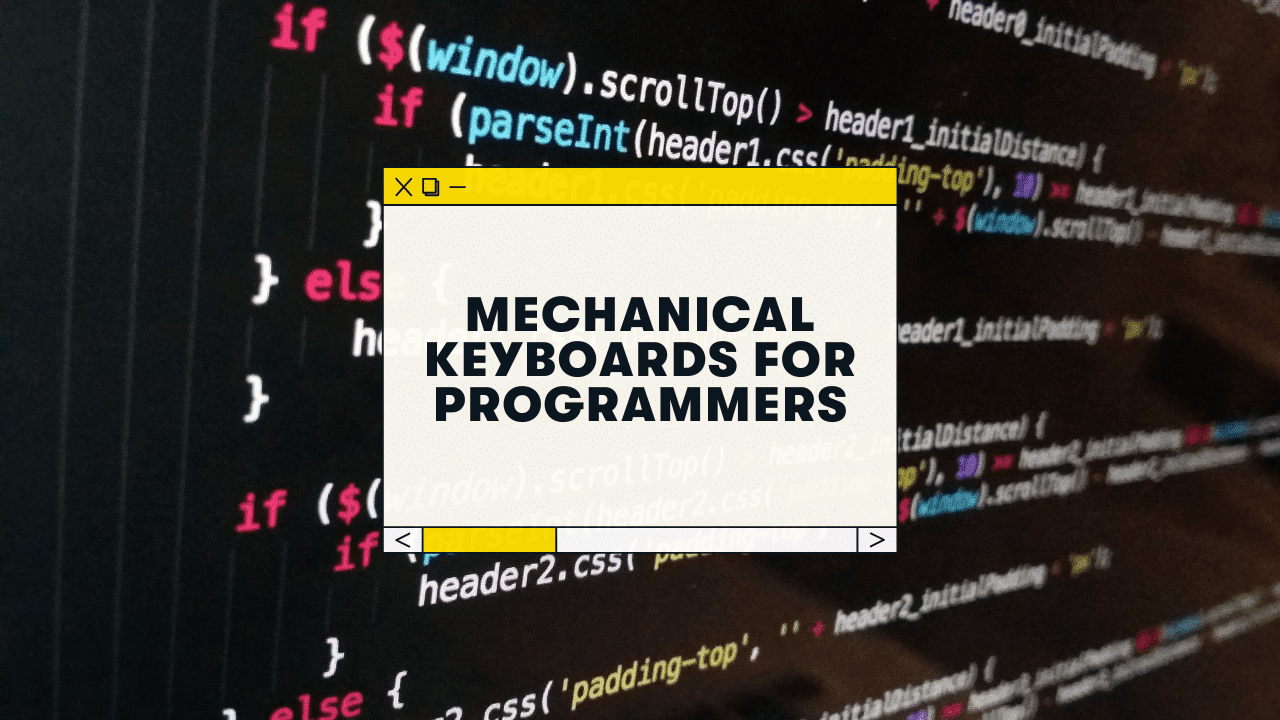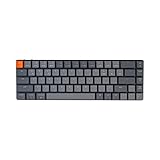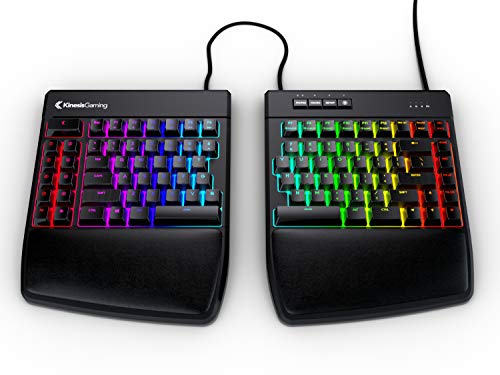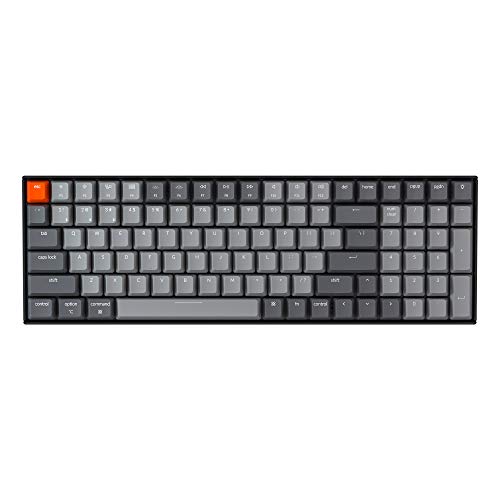Debugging your messy Python code but still want to click and clack?
These are my recommendations for the best mechanical keyboard for programming (updated for 2023).
As a former dev myself—I can honestly say that upgrading keyboards absolutely changed my work and my life!
But there are also some important things to consider (like not driving your coworkers insane with your uber-loud clacking 🤦♂️—or getting a keyboard that LOOKS great—but doesn’t have the features you need to code productively).
I’ve found the following keyboards to be the best overall for programmers & developers:








How I test & recommend keyboards:
There are a few basic factors I look for:
- Size & layout (this is an important one for developers)
- Comfort & Ergonomics (same if you code more than an hour or two a day!)
- Portability
- Macros and/or programmable keys
- Wired vs Wireless
- Options like different switch options, RGB backlighting, keycap options, etc.
For programmers/developers, it’s important to have a keyboard that is COMFORTABLE for long periods of use (your job is on your keyboard!), as well as making sure you have the right SIZE keyboard for your specific work (I find it hard to do my work on a 60% compact keyboard, but a TKL (80% or 75%) is perfect.
Corsair K95 (or K100) – Best overall
- Per-key RGB backlighting and a 19-zone LightEdge across the top of the keyboard delivers dynamic and vibrant lighting effects with near-limitless customization
- Tuned for low noise operation even at full load; MTBF hours
- Gain an in-game advantage with six dedicated macro keys fully programmable for complex macros and key remaps or swap to the included S-key keycaps and program special streaming commands through Elgato...
It’s interesting how many “gaming features” actually carry over into programming…
- Extra macro keys
- Better ergonomics (in this case, a detachable padded wrist rest)
- Media keys
The Corsair K95 is a tad pricey for a non-custom mechanical keyboard, but it’s features MORE than make up for the price tag.
- Full RGB
- Several Cherry MX switch options (including speed silvers!)
- Extra macro keys (which apparently works well out of the box for custom Elgato Stream Deck software)
- Media keys including a volume dial
- Packages available with mouse, mouse pad, etc.
It’s not wireless or hot-swappable (meaning you can’t easily change out the switches), but if you don’t think you’ll miss those—this might be the perfect keyboard for programmers & developers.
Also, it comes with a few extra keycaps (just for fun) and a keycap puller!
| PROS ✅ | CONS ❌ |
|---|---|
| Extra macro keys, media keys, and volume dial | Not everybody wants a low-profile mechanical keyboards |
| Detachable wrist rest | Not hot-swappable |
| Full RGB | Wired only |
| Programmable keys | Not hot-swappable |
| Cherry MX switch options | A little pricey |
Wanna step it up a notch further? Upgrade to the Corsair K100.
The K100 is even MORE pricey but features Corsair’s “Axon hyper-processing technology,” which could save you an entire millisecond or two while you’re recording scripts. >_<
And, a multi-function knob! You can rewind or fast-forward media, scroll through applications, zoom in and out, adjust brightness, etc, all with the rotary knob on the top.
Wanna save money? Downgrade to the Corsair K60.
It’s a very similar look and feel to the K95, but with no extra macro keys, and no switch options.
Related reading:
Logitech G915 TKL Lightspeed – Best Low-Profile
- LIGHTSPEED wireless delivers pro-grade performance with flexibility and freedom from cords. Creates a clean aesthetic for battlestations. Delivers 40 hours on a single full charge.
- LIGHTSYNC technology provides RGB lighting that synchronizes lighting with any content. Personalize each key or create custom animations from ~16.8M colors with Logitech G HUB software.
- Low Profile mechanical switches offers the speed, accuracy and performance of a mechanical switch at half the height The GL Tactile switch produces a discernible bump at the point of actuation. Comes...
Is Logitech G915 good for programming?
Even though the G915 has a heavy price tag ($150-200), you get what you pay for! There are tons of great features that programmers will enjoy.
The G915 series (there are several sizes and switch options to choose from), you get a few awesome benefits:
- A full-size version available with 5 programmable “g-keys”
- Low-profile mechanical switches = the right way to do a low-profile keyboard
- Great RGB options
- Wireless!
- Low-battery notifications right on the board
The G915 might not be the most uber-customizable mechanical ever (it’s not hot-swappable), but that might be it’s only real con.
Some folks love the Logitech software (I don’t use it), so if you’re into macros and customizing keys—you won’t need a 3rd party keymapping tool.
It works for Mac as well (as long as you can edit the modifier keys of course).
Overall, the Logitech G9115 is just a really simple way to get a great mechanical keyboard right out of the box, complete with all the features you want as a developer and/or gamer 😉
| PROS ✅ | CONS ❌ |
|---|---|
| Wireless | Not everybody wants a low-profile mechanical keyboards |
| 80% TKL size but has media keys, etc! | Not hot-swappable |
| Good switch options (low-profile) | |
Low-Profile Runner Ups: The Keychron K7 and K3
Want a low-profile keyboard but not looking to drop a few hundred bucks?
I’m in LOVE with my Keychrons (I work on a Mac, but they work perfectly fine on Windows, too). The K7 is the 60% layout low-profile, and the K3 is the 75% TKL version.
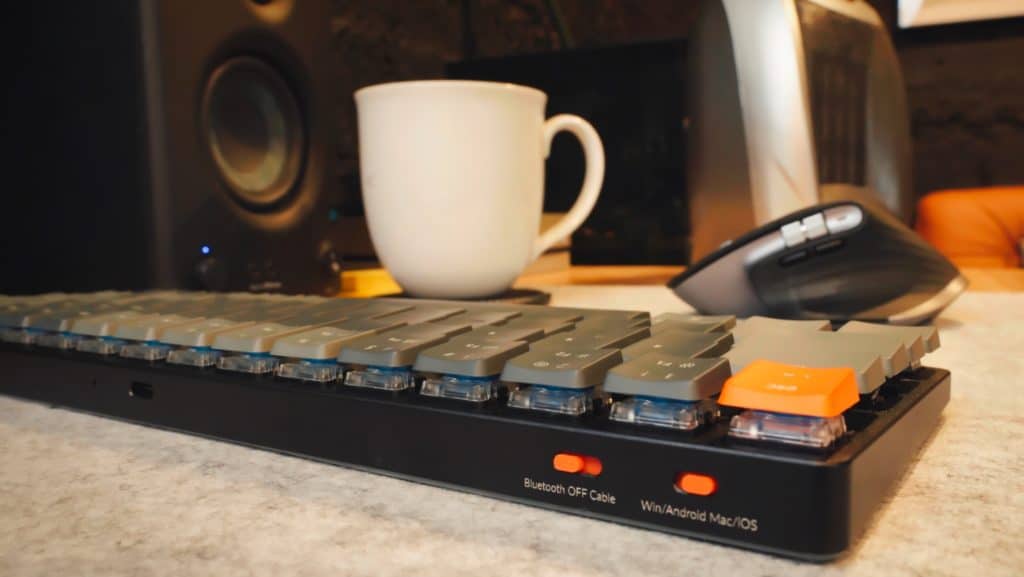
We have an entire post dedicated to reviewing the best low-profile keyboards, so go check out that post for more recommendations!
Anne Pro 2 – Best Compact & Travel Friendly Keyboard
- Minimalistic design doing more with less. Requires less hand movement while still being able to access all the functionalities.
- Compact and Portable . It saves desk space and easy to carry around. Fits right in backpack. Perfect for home, work and on the go.
- Decent bluetooth connectivity enables wireless connection up to 4 devices and switch seamlessly back and forth.
The Anne Pro 2 is probably one of the top-selling mechanical keyboards of all time, and for good reason: It’s the perfect budget keyboard.
It’s not too cheap, so it has all the great features, but it’s fitted with a plastic frame and comes stock with Gateron or Kailh switches (great budget switches).
It’s definitely NOT low-profile (which I prefer, but you might want to grab a wrist rest if you start experiencing finger or wrist pain).
The Anne Pro 2 design is flawless to my eyes. I hate when the cheaper Amazon brands put their logo on the top or side of the keyboard, and thankfully the Anne Pro 2 avoids that!
- Great battery life
- Can pair with up to 4 devices
- N-key rollover
- 100% programmable keys
The list goes on. It’s a fantastic portable keyboard in that price range!
But—no dedicated arrow keys, function row, or numpad.
| PROS ✅ | CONS ❌ |
|---|---|
| Great price point | Not hot-swappable |
| Wireless | Some people may miss arrow keys, function row, numpad, etc. |
| Sleek 60% design | No extra media keys, macro keys, etc. |
| 100% programmable keys | |
| Switch options | |
| Case color options (black/white) |
Which keyboard size is best for programming?
Keyboard size depends entirely on your needs. If you do not need the tenkey numpad, the funtion row, or dedicated arrow keys, you might be just fine with a 60% compact keyboard!
Click here to check out our best 60 percent keyboard recommendations.
However, most developers I know tend to make use of arrow keys when they code, and so a medium size (such as 75% or 80% TKL keyboards) will serve them better. The sizes omit the numpad as well, so it still saves some desk space.
If you regularly use macros or custom keybinds, you might find a full-size 100% keyboard with extra macro keys (like the Corsair K95 or Logitech G915)!
Kinesis Freestyle Edge – Best Ergonomic Design
- ERGONOMIC SPLIT DESIGN FOR TYPING AND GAMING: Move the right module out of the way and bring your mouse in close for improved endurance and more precise aim (eSports proven). rotate the left module...
- 100% MECHANICAL SWITCHES FOR MAXIMUM PERFORMANCE: Genuine Cherry MX Brown speed mechanical switches (low-force, tactile feel) offer professional-grade responsiveness and unmatched durability (50M...
- IMMERSIVE RGB LIGHTING FOR A CUSTOM LOOK: 16.8M color per-key RGB Backlighting with 10 customizable effects like wave, spectrum, rebound, pulse, rain and much more. Install lighting expansion pack 1...
It’s no secret that a “normal” keyboard doesn’t actually do much to help our developing wrist and finger pain—and ergonomic keyboards are one answer to that.
Ergonomic keyboards are supposed to reduce typing fatigue by positioning the keys in the way that your hands naturally lie.
And my favorite type of ergonomic keyboard? The split keyboard!
The Kinesis Freestyle Edge is a keyboard quite literally split down the middle (with a cable connecting the two halves). This allows you to adjust the position to the way YOUR hands naturally code ;)’
The Edge also has…
- a padded wrist rest
- Extra programmable macro keys!
- Full RGB with customizable effects, etc.
And if you want to go one step further? You can pay a bit more to check out the Kinesis Advantage 2.
| Preview | Product | Rating | Price | |
|---|---|---|---|---|
 | Kinesis Advantage2 Ergonomic Keyboard (KB600), Black top case, Cherry MX Brown Switches, QWERTY... | $339.00 | View on Amazon |
It’s not a split keyboard, but it has a contoured shape proven to be more comfortable. It’ll definitely take some getting used to, but dang does it look amazing, too.
| PROS ✅ | CONS ❌ |
|---|---|
| Mostly the “split” design allowing get the perfect ergonomic fit for your hands/arms. | Not hot-swappable |
| Extra macro keys | Wired only |
| Quick access buttons on the top to easily record macros, etc! Nifty. | A bit pricey (but not terrible?) |
Keychron K4 – Best for Mac Users
- A 96% layout (100-key) white LED backlight wireless mechanical keyboard with a number pad in a compact design that’s built for productivity and a tactile typing experience.
- Connects with up to 3 devices via Bluetooth and switch among them easily. With high reliable and broad compatibility Broadcom Bluetooth 5.1 chipset, the K4 version 2 is best to fit home, office and...
- With a unique Mac layout, the K4 has all the necessary Mac function keys while still being compatible with Windows. Extra keycaps for both Windows and Mac operating systems are included.
As a long-time Mac nerd (and developer! Xcode ftw!), I can say there’s one clear mechanical keyboard brand for MacOS: Keychron.
I own 3-4 different keychrons (The K2, K7, K12, and K4), and there are a few options that make them the best for Macs:
- They come with extra Mac modifier keycaps (Command, etc)
- There’s a Windows/Mac physical toggle button on the side of the keyboard (meaning you don’t have to touch software settings to switch between Windows and Mac!)
- Mac-specific media keys and controls!
All those in addition to the normal benefits of a great wireless keyboard like N-key rollover, multi-device pairing, RGB, etc, etc!
Work on both Windows and Mac? Keychrons are a must!
The Keychron K4 is the “almost-full-sized” 96% layout, meaning it still has the numpad, but the extra “dead space” has been taken out to save desk space.
Keychrons are one of my favorite keyboard brands in general—so you can’t go wrong! Just choose a size that works best for you, and Keychron makes a keyboard for it 😉
| PROS ✅ | CONS ❌ |
|---|---|
| GREAT compatibility with Mac AND Windows | Not a ton of programmer features, i.e. extra macro keys, etc |
| Great price | Very high-profile (unless you get the K7 or K3, which are specifically low-profile) |
| Several size and layout options | A bit pricey (but not terrible?) |
| Switch options | |
| Hotswappable versions available! | |
| Full RGB versions available, as well as white-only to save a few bucks | |
| Wireless! |
FYI, click here to see our best mechanical keyboards for Mac—there are tons of other brands that work great out of the box with MacOS!
Tecware Phantom 104 – Best Budget Pick
- PREMIUM TYPING EXPERIENCE: Experience unparalleled performance with the Phantom 104 Key Mechanical Keyboard. Every inch of this keyboard is meticulously crafted, fine-tuned, and specially engineered...
- 16.8 MILLION COLOR RGB LIGHTING: With 16.8 million colors and dynamic lighting effects, this LED mechanical keyboard will become a captivating centerpiece, enhancing your gaming setup or workspace.
- 18 PRE-SET LIGHT MODES: Express your unique style and personality with 18 pre-set RGB lighting modes. From pulsating waves to dynamic color shifts, you have the freedom to tailor the lighting effects...
Saving your cash to travel the world and go full-out digital normad?
You can pick up the Tecware Phantom on Amazon for under $40-50.
That. is. insane. for. what. you. get.
It’s actually one of the ONLY budget keyboards we’ve received that is hot-swappable (so you can easily put in whatever switches you want!).
FYI–we have a full review of the Tecware Phantom here.
It’s got most of the normal features (except wireless capabilities), including 3 Outemu switch options (clicky blue switches, tactile brown switches, and linear red switches of course).
The Phantom 104 is the full-sized version, but they also sell an 80% layout, the Phantom 87.
| Preview | Product | Rating | Price | |
|---|---|---|---|---|
 | TECWARE Phantom 87 Key Mechanical Keyboard, RGB led, Outemu Brown Switch | $45.99 | View on Amazon |
Tecware even has its own proprietary software, allowing you to record and assign macros, customize per-key RGB, and even save user profiles. (full disclosure, I don’t have any experience using their software, and I have no idea if it works on mac).
| PROS ✅ | CONS ❌ |
|---|---|
| Uber affordable | No extra media keys or fancier features (do ya really need those?) |
| Full RGB | Wired only |
| Hot-swappable(!) |
Razer BlackWidow Elite – a Premium Keyboard With USB-Pass-Through Ports
- Quickest Mechanical Switch for Gaming: Razer Yellow switch technology beats competitor, legacy "speed" keys in actuation distance by up to 20%, requiring 45 G of force; ideal for fast-paced gaming...
- Ultimate Personalization & Gaming Immersion with Razer Chroma: Fully syncs with popular games, Razer hardware, Philips Hue, and gear from 30+ partners; supports 16.8 million colors on individually...
- Fully Programmable Macros: Razer Hypershift allows for all keys and keypress combinations to be remapped to execute complex commands
The BlackWidow Elite is another fancy-pants keyboard that packs in some extra features:
- Magnetic wrist rest
- Multi-functional media buttons and knobs
- A pass-through USB port
- An audio pass-through port
While I’m personally not a big fan of Razor’s proprietary switches (just gimme plain old Cherry or Gateron options, please), I DO like USB pass-throughs.
Check out our full guide to mechanical switch colors here!
It’s one of those keyboard features that doesn’t sound that interesting until you find a good use for it—then OMG it’s nice. For me, I built a custom macro pad (for streaming and extra media knobs) that I like to plug into the USB pass-through ports to save cable space.
Handy!
| PROS ✅ | CONS ❌ |
|---|---|
| Extra media knob and buttons | Wired only |
| Full RGB | Not hot-swappable |
| Detachable wrist rest | I personally don’t like Razor switches |
| USB pass-through and audio pass-through ports(!) |
Programmer keyboard honorable mentions:
The following keyboards are ones I have ZERO direct experience with, but I’ve seen mentioned in a ton of places:
This hard-to-find keyboard offers integrated display keys! One of the only keyboards that does that. It also has some decent switch options and is hot-swappable.
It runs around $250ish, and is wired-only. (you might be able to find it on Amazon here, else check the link above)
I have typed on this one before, and it’s legit! It’s not wireless or hot-swappable, but it has plenty of other bells and whistles, including a volume knob, media keys, TWO USB pass-through ports, etc.
I’m a big fan of Das Keyboards in general.
I had no clue that EVGA even made keyboards, but apparently, they do. This looks REALLLLY similar to the Corsair keyboards above, but it’s hot-swappable!
It’s wired only but has all the other standards, including
- RGB
- Size options
- Kailh switch options
- N-key rollover
- Detachable wrist rest
The Drop keyboards are expensive, but shiny!
The Drop Alt is a 65% layout (with arrow keys and some home cluster keys), and has side lighting in addition to full RGB! It has an upgraded aluminum frame (as opposed to plastic frames in budget boards), and is quite heavy.
It’s definitely a well-built machine with decent features, but I’ve personally felt “meh” at this price point.
Drop keyboards also work on Mac and support customization through Via!
Mechanical Keyboard Buying Guide for Developers
You might have gathered this much already, but there are few specific features that programmers need to be aware of—in addition to the usual stuff to look out for:
Size and Layout
While you might save desk space with a compact 60% layout, you might be limiting productivity in your work without the numpad, function row, and/or home keys!
For me, I don’t use the numpad or function row, but I DO like my arrow keys and home cluster.
I prefer a 68%, 75%, or 80% TKL size.
Comfort and Ergonomics
Arthritis, wrist pain, and finger fatigue is no joke! Especially if you spend all day at your computer for work (and play? I know y’all game, too).
In addition to researching ergonomic keyboards, like the split keyboard Kinesis above, also pay attention to the height of mechanical keyboards.
If you’re used to a low-profile keyboard, you’re likely better off searching for a low-profile mechanical. Mechanical switches are taller by design than typical membrane keyboards, and they can be a stretch if you’re not used to it.
Will it work in your office?
If you DO work in an office–is it quiet enough not to pester coworkers or offend would-be clients with crazy RGB colors?
Related reading: Are mechanical keyboards good for office work?
Portability & Size
If you travel with your keyboard at all (whether you’re a digital nomad, work out of coffee shops, or simply take your keyboard to meetings around your office), you’ll probably want to stick with a wireless mechanical keyboard.
That, and you might prefer a more compact layout like a 60% or 80% board.
Programmable keys and/or macro keys
While the normal human population probably doesn’t need these at all—developers and gamers are often searching for shortcuts—in terms of typing or coding!
Having extra macro keys can be handy for code syntax, recording software macros, etc.
Switch Options
Mechanical keyboard “switches” are the mechanical devices just underneath the keycaps that you press down. When you press down, a “stem” travels down (with resistance from a tiny spring) and activates the keystroke to the motherboard (i.e. PCB).
And they make tons of different types of switches!
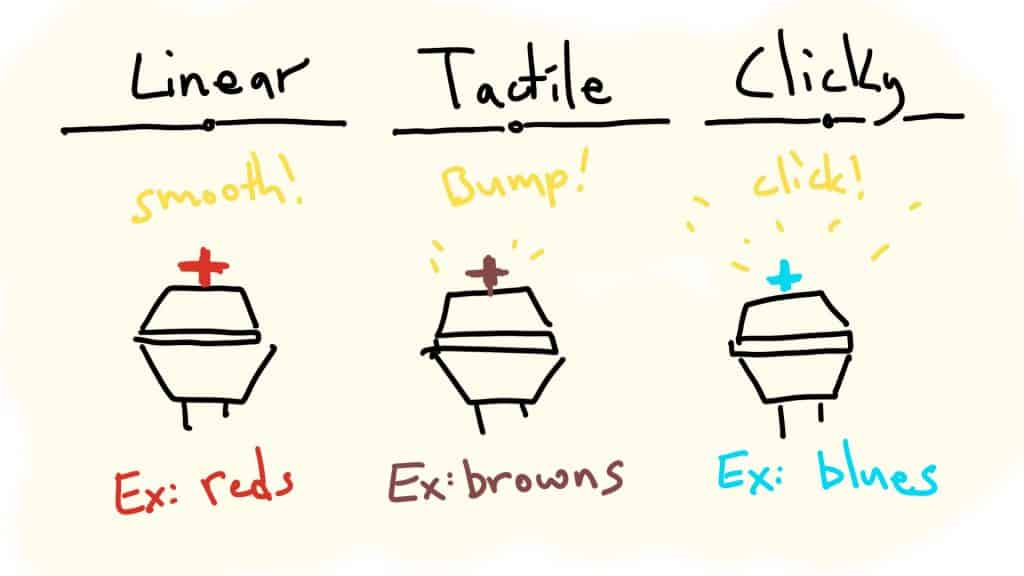
- Linear switches (common colors include Red, Black, Yellow) are smoother and softer (and a fraction of a millisecond faster)
- Tactile switches (Brown, Clear) have a tiny “bump” you can feel when the key is actually activated.
- Clicky switches (Blue, green) are tactile switches, but with a small “click” noise on the keystroke
See below for some switch recommendations for programmers.
Backlighting and RGB
Do you want a fancy light show from underneath your keycaps? Do you want to customize the colors, patterns, etc?
RGB is pretty common among mechanical keyboards these days, and you can always turn it off if you’d prefer!
Mechanical Keyboards for Programming F.A.Q.
Which mechanical keyboard is best for programming?
Though it will depend on your specific needs, you’ll probably want to grab a keyboard built for accuracy and comfort. Since you literally work and play on your computer, you’ll be spending a lot of time on the keyboard, so it’s vital you consider ergonomics (both the layout of the keyboard, as well as the height).
Developers might also enjoy extra macro and media keys that they can customize, leading to more productivity.
We recommend the Corsair K95 as our top pick for programmers, but the Tecware Phatom and Anne Pro 2 are excellent choices as well.
Should Coders Use Mechanical Keyboards?
Since coders spend a LOT of time on a keyboard, a mechanical keyboard brings two main benefits: improved typing & coding speeds (and accuracy), as well as improved ergonomics.
If your main job revolves around your keyboard, you’ll want to choose an instrument that reduces wrist and finger fatigue and helps you stay productive.
And aside from that, it’s also important to enjoy your work whenever you can, and a highly customizable mechanical keyboard can certain be a lot of fun!
Are 60% keyboards good for programmers?
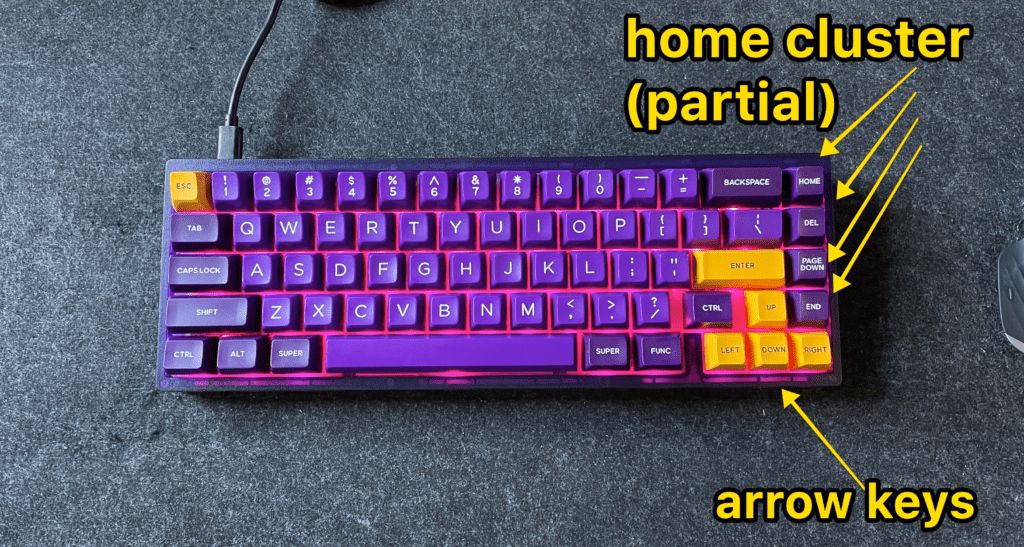
As long as you don’t need the tenkey numpad, function row, and dedicated arrow keys, a 60 percent keyboard should be perfectly fine (and even free up some desk space)!
The Anne Pro 2 is one of the more popular compact 60% keyboards we recommend.
Programmers might also consider a 65% (or 68%) mechanical keyboard, since it’s roughly the same size and layout, but with dedicated arrow keys and the “home,” “delete,” “Page Up,” and “Page Down” keys!
What Are the Best Switches for Programming?
From the three main categories of mechanical switches (Linear, Tactile, and Clicky), programmers should probably choose either Linear or Tactile switches.
Clicky switches are generally louder and could annoy coworkers (or even the other coffee shop patrons!)
If you do any gaming on the side, linear switches are your best bet. They’re generally the smoothest, softest, and fastest (but only but a tiny margin).
Some of my favorites are Cherry MX Reds, Gateron Ink Blacks, or Gateron Milky Yellows.
However, tactile switches are generally preferred by anybody who does a large amount of typing (including anybody who codes), due to their tactile feedback. This can mean more accuracy and faster typing speeds.
Is the Magic Keyboard Good for Programming?
If you work on a Mac, you’re probably used to the low-profile action of the Magic Keyboard. However, the Magic Keyboard is lacking on some common features that programmers find useful in mechanical keyboards.
The Magic Keyboard doesn’t have any programmable keys or extra macro keys, and most programmers will likely find coding on a mechanical keyboard to be a bit faster and more accurate (especially with tactile mechanical switches that give feedback to your fingers)!
The best news? There are several low-profile mechanical keyboards that work great with Macs, like the Keychron K7. It won’t be a hard transition from the Magic Keyboard, and still yield plenty of awesome benefits of a mechanical keyboard.
